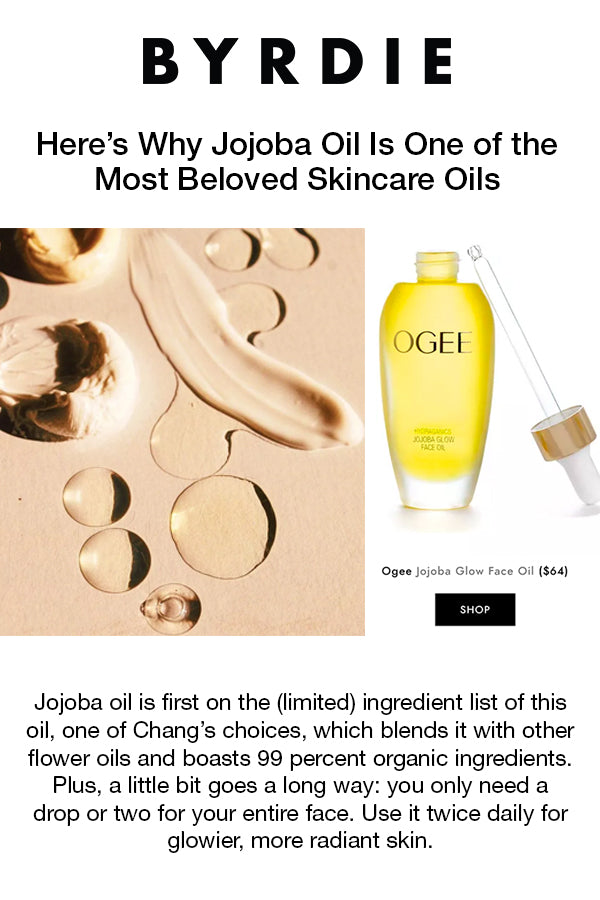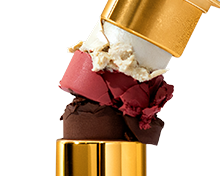Here's Why Jojoba Oil Is One of the Most Beloved Skincare Oils

It wasn't that long ago that "oil" was a dirty word in the skincare world, something meant to be removed from your skin, rather than added back on. But, as Bob Dylan said, times they are a-changin'. Walk through any skincare aisle (or haircare aisle for that matter) and you'll quickly notice that not only are there plenty of oil-based products, but also a variety of different oils being touted. There's of course the oh-so-buzzy coconut oil, lauded for being a one-stop-shop for all your beauty needs, hyped up Moroccan argan oil for hair… the list goes on and on.
It can be overwhelming, for sure, especially given that the success of using an oil in your beauty routine largely hinges up on which one you choose. Breaking news: Not all oils are created equal. But no matter whether you're an oil newbie and are looking for a surefire safe pick, or are an oil veteran looking for one that can address a variety of issues, jojoba oil is the way to go. Ahead, New York City dermatologist Marnie Nussbaum, MD, and Y. Claire Chang, MD, a board-certified dermatologist at Union Square Laser Dermatology in New York City explain exactly what sets this particular oil apart from the rest of the crowd, and why you should seriously consider giving it some play time in your skincare routine.
It can be overwhelming, for sure, especially given that the success of using an oil in your beauty routine largely hinges up on which one you choose. Breaking news: Not all oils are created equal. But no matter whether you're an oil newbie and are looking for a surefire safe pick, or are an oil veteran looking for one that can address a variety of issues, jojoba oil is the way to go. Ahead, New York City dermatologist Marnie Nussbaum, MD, and Y. Claire Chang, MD, a board-certified dermatologist at Union Square Laser Dermatology in New York City explain exactly what sets this particular oil apart from the rest of the crowd, and why you should seriously consider giving it some play time in your skincare routine.

What Is Jojoba Oil?
"Jojoba oil is a natural oil produced from the seed of the…chinensis plant, a drought-resistant shrub native to southern Arizona, California, and Mexico," explains Chang. (Oh, and FYI, since we know you're wondering, it's pronounced ho-ho-ba.) While its prominence in beauty products is a relatively recent phenomena, it's been used for centuries; Native Americans used it as far back as the 1400s for its wound healing properties (more on those in a minute). Here's where things got a little confusing, though—jojoba oil isn't technically an oil.(Say what?) It's actually a wax ester that, from a chemistry perspective, has a different makeup than other oils. While everyone calls it an oil—and we'll continue to do so just to keep things simple—that fact that it's a wax ester is a large part of what makes it so unique. Wax esters are a main component in human sebum, which means that, "jojoba oil mimics natural sebum, conditioning, and sealing moisture in the skin, without clogging pores or exacerbating acne," says Chang. Translation: Jojoba oil is as close to your skin's natural oil as you can get.
This is also why it can help balance out oil production and feels so lightweight and non-greasy.
The other upshot of this oil not being an actual oil? "It's more stable and has a longer shelf-life than most oils," points out Nussbaum. Couple that with the fact that it plays so nicely with most other ingredients, and it's no surprise that it can be found in a wide array of skincare, hair care, and makeup products. Even the jojoba beads that are a popular (and much more environmentally-friendly alternative to synthetic micro beads) found in exfoliators are derived from, you guessed it, jojoba oil.
Benefits of Jojoba Oil for Skin
No matter in what form or formula it comes in, the long list of benefits it delivers remains the same.- Helps maintain skin hydration: As is the case with other oils, jojoba oil is a great emollient, softening and smoothing your complexion. And when it's combined with occlusive ingredients, such as beeswax, it also helps protect the skin barrier, reducing trans-epidermal water loss and sealing in moisture, notes Nussbaum. At the same time, because it does act so similarly to our skin's oil, it helps balance out those levels, useful for anyone dealing with either too much or too little natural oil.
- Offers antioxidant protection: "Jojoba oil is rich in flavonoids and vitamin E, a potent antioxidant that defends the skin against oxidative damage, which contributes to signs of aging," says Chang. While she adds that more studies are needed to confirm its direct anti-aging benefits, it's still a good option to use at any age, to help both protect and brighten the skin.
- Has anti-inflammatory properties that help soothe skin: Dealing with eczema, rosacea, or a generally sensitive complexion? Jojoba oil is saving grace for reducing redness and keeping skin calm and comfortable, says Nussbaum. Along with the vitamin E found in the oil, it's also a good source of B-complex vitamins, she adds. These vitamins, along with the anti-inflammatory effects, make it useful for wound healing, which is why Native Americans originally started using it all those years ago.
- Is useful in helping treat acne: For acne-prone skin, jojoba oil takes the cake. First and foremost, it's non-comedogenic and won't clog pores, an imperative quality to search for if you have oily skin but still want to use an oil. Two, you're reaping all those anti-inflammatory benefits (as well as possible antibacterial properties, though more research need to be done), both of which can help knock out breakouts. And finally, there's the fact that it can balance out your skin's natural oil production. "Since an over production of sebum can often cause breakouts, using jojoba oil has been shown to ease acne," explains Nussbaum.
Side Effects of Jojoba Oil
Generally speaking, there are no real drawbacks to this particular ingredient. Jojoba oil is generally well-tolerated with a low risk of irritation, Chang tells us. In rare instances, it can cause a rash or reaction, which is usually indicative of an actual allergy, Nussbaum points out. If you want to be extra cautious, you can try any new product out on a small test area before applying it all over your face.How to Use It
Opt for 100 percent pure jojoba oil to use as a moisturizer, or look for it in a lotion, cream, or serum. Worth noting: It works great as a hair hydrator too, ideal for sealing dry ends, as well as a treatment for smoothing chapped lips.The Best Products With Jojoba Oil
Ogee Jojoba Glow Face Oil ($64)Jojoba oil is first on the (limited) ingredient list of this oil, one of Chang's choices, which blends it with other flower oils and boasts 99 percent organic ingredients. Plus, a little bit goes a long way: you only need a drop or two for your entire face. Use it twice daily for glowier, more radiant skin.


